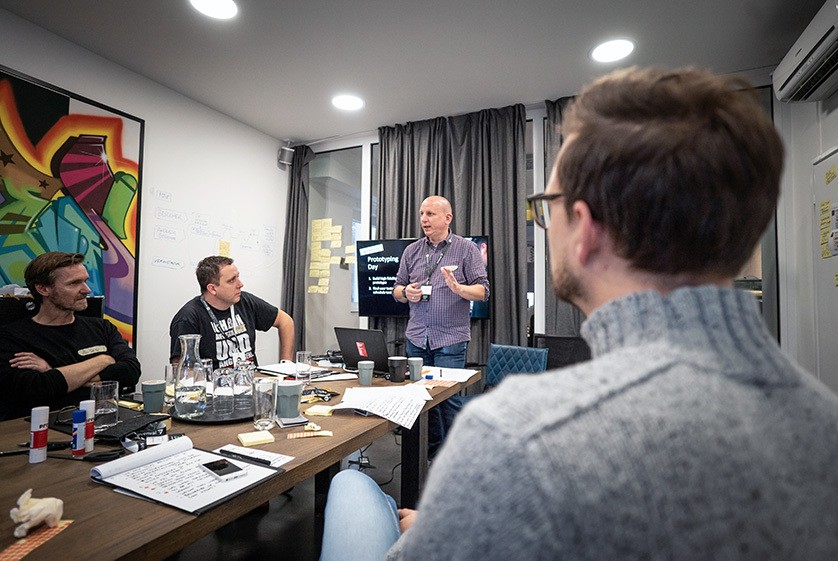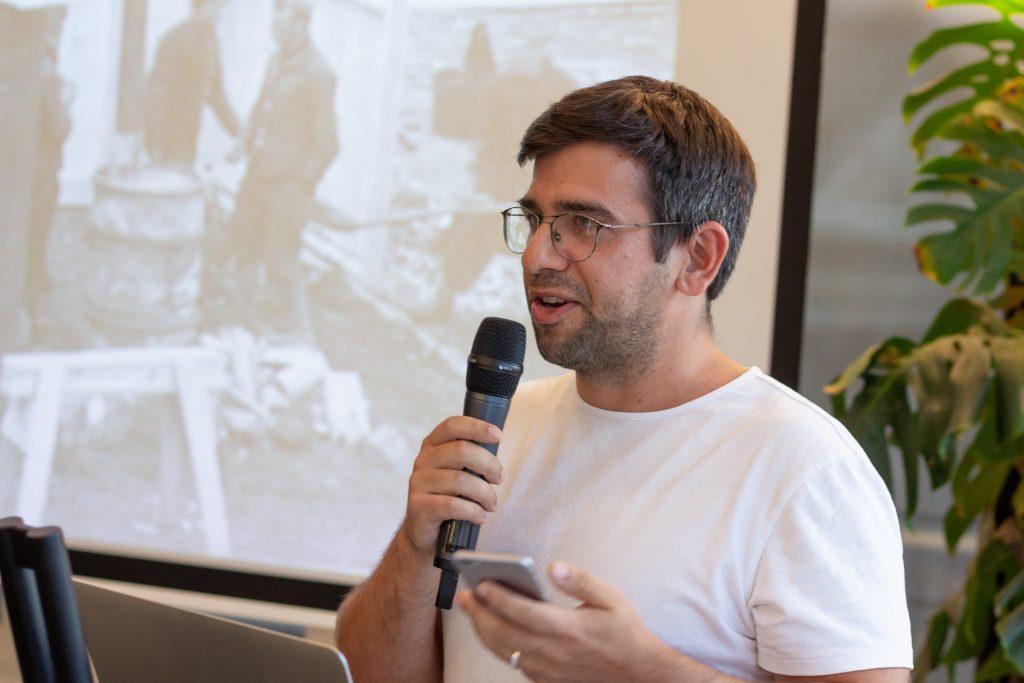Remote-Ready: Ali Greene Director People Ops at DuckDuckGo about career mentors
25. September 2019
In this article series, we feature successful remote-ready companies and ask them how they collaborate effectively in a remote environment.
The privacy-focused search engine DuckDuckGo has risen to new popularity over the last few years. With the release of a browser extension and a mobile app, the company has expanded its products to protecting privacy whenever its users are online regardless of the device. As their product catalog continues to grow, so does the whole company, which is fully remote.
We spoke to Ali Greene, Director People Operations at DuckDuckGo, about their remote setup. Ali herself works as a digital nomad, moving to a new work location “somewhere between every two weeks and every two months.”
- Here is what you will learn in this interview
- How DuckDuckGo uses project advisors and personal career coaches to ensure knowledge sharing and mentorship.
- How the company is organized in cross-functional teams and groups with the same expertise.
- How a joint mission for online privacy supports trust and collaboration.
Ali, how does your current organizational setup look like and in which units do you work remotely?
DuckDuckGo is fully remote. People are free to work whenever, wherever they want. We have about 70 employees spanning over 16 countries. And some people travel full-time, like me for example.
We organize ourselves in two different ways. One is a crossfunctional way, in which the teams work towards our objectives and goals. This is where the work gets done. The other way is based on people’s shared expertise. We call this a Functional Team, that basically acts as an employee’s homebase. It’s a group of people in which people can get closer to each other and lean on for best practices and knowledge-sharing in an organization despite working around the world. My homebase, for instance, is the People Ops team.
How does your collaboration practice look like on a day-to-day basis?
We do lean to working asynchronously to let everybody work when they feel the most productive. I noticed that other remote companies have a concentrated group in the same time zone. We don’t have that, we are very distributed.
We want to give people the flexibility to fit work into their entire life.
They should be able to move projects forward, regardless of where they are working.
However, we do have some commonalities for all teams. We have all our objective teams synchronously hold a weekly meeting to talk about how projects are going, where someone needs help, talking through the roadmap, brainstorming. These are strategic meetings. Each functional team meets on a cadence that works for them. The people ops team meets twice a month. One is a half-hour check-in. The other is a ninety-minute deep dive into a special topic.
And then one-on-ones are still frequent and common. We want to make sure that people don’t feel isolated. Everybody has weekly meetings with a dedicated advisor, who is a go-to person for help within the organization for certain challenges one might have and to get feedback.
Do you have any key paradigms or must-haves for organizing your remote work collaboration?
The number one must-have is to trust your people. Without trust, remote work becomes increasingly challenging and instead of focusing on accomplishing your goals you as a company are spending wasted time creating mechanisms of checking-in or enforcement of unnecessary process.
What I love about how DuckDuckGo hires, we look for people who have the same passion and mission about what we are trying to achieve in the privacy area. And that really builds a strong foundation from the get-go. You are truly working with your peers.
I’m just always in awe, how intelligent my colleagues are and how hard everybody is working.
We all want the same success. And right from there we have this level of trust, that work is getting done and we don’t need to micromanage each other.
All of our work is organized around tasks. People know very clearly what they are responsible for. If they are directly responsible, we tell them what our expectations are. For example, we expect a written update once a week about the trajectory of a project, so that everybody can get excited about where it is going, or offer help if things are moving slower than expected.
Which are the most important tools for your remote collaboration?
We have a specific approach at DuckDuckGo to tools that goes back to the strong focus on privacy with our products. We want to make sure that we are using tools that live up to our standards, as well.
Two tools are the bread and butter of how we collaborate. We use Asana to work on our top priorities, to work on projects and in small groups. We use Zoom for synchronous meetings and also for building human relationships. Then we use Fastmail for external email and Mattermost for our internal chat.
How do you reflect the remote work specifics in your approach to leadership, coaching and mentoring?
There are two roles, I want to talk about, that people have in our organization.
One is a project advisor. Whenever you kick off a new project, one question is asked: Who is the best person to advise this project you are working on? It can be someone who has technical expertise that is above your own, so you can learn the necessary skills and how to execute certain aspects of the project. It could be someone who is in a been-there-done-that-position and already knows how to get the job done with their eyes closed. By changing them over time, we are making sure that each individual in the organization gets the chance to meet a variety of people to ask for advice or just for brainstorming a certain question.
But we also realize that consistency is important, not only in work relations but in any relation. So everybody in the company has a long-term career advisor. This is someone who is more traditionally a mentor or a coach, with whom you don’t necessarily have to work closely all the time. It is someone you can meet once a week and talk through different things, like how are you dealing with stress or a new project that is outside your comfort level or the upcoming meeting you are going to present in. It is someone who will always be there, who you can build a relationship with.
What do you do to make working remotely fun?
There are so many things I could talk about here, but I will limit it to three.
The first thing, that is very important to us, is to allow people with similar interests to genuinely connect with each other. For that, we have a thing we call “guilds”. Guilds are shared interest groups that happen remotely. One guild is called Movies & Films. People in this guild watch movies together and critique them. We have a design guild (and you don’t have to be a designer to join). There even is one for sumo wrestling, which is very small, but there are people from all over the world who want to talk about it.
Second: Yes, we meet up in person from time to time. There is an annual meetup once a year, where the whole company comes together. And there are smaller meetups, where the teams can meet each other. We also have informal gatherings in the form of co-workation, which are half work, half vacation, that people can spend together.
Just recently, we had people meet in Peru for work, and then they went to Machu Picchu together.
This is pretty new to us, but we are constantly exploring ways to organize collaboration between people.
And third, to acknowledge that not everybody can travel or likes to travel, we also encourage people to connect remotely on a more regular basis. Every Friday, we assign a random group of people to meet together 20 minutes before our company meeting starts. We prepare a couple of questions to start a discussion like “What was one cool thing that happened to you this week?” and I look forward to these meetings every time.
Which key skills are important to work effectively in your remote work organization?
We have talked a lot about transparency and trust. We try to live by that at DuckDuckGo and it works both ways. When things are very transparent, then everybody wants to be transparent, too.
Effective self-management is important. Having the skill of not only self-awareness but knowing what to do about it in order to stay productive is really important. Some people like to work nine-to-five, others are night owls and want to get that code out at 4 am.
Having strong communication seems obvious, but there is so much more to this than being able to communicate. You also need to know how to receive communication, how to listen with empathy and be respectful of each other. That includes being able to ask questions, to challenge but also to collaborate on ideas in brainstormings. There are all of these very subtle things that happen in communication when you are in person like hand gestures. You have to figure out a way to do that effectively when you are working remotely.



